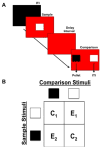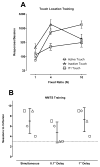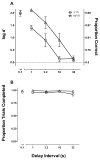Effects of environmental and pharmacological manipulations on a novel delayed nonmatching-to-sample 'working memory' procedure in unrestrained rhesus monkeys
- PMID: 26003863
- PMCID: PMC4500667
- DOI: 10.1016/j.jneumeth.2015.05.009
Effects of environmental and pharmacological manipulations on a novel delayed nonmatching-to-sample 'working memory' procedure in unrestrained rhesus monkeys
Abstract
Background: Working memory is a domain of 'executive function.' Delayed nonmatching-to-sample (DNMTS) procedures are commonly used to examine working memory in both human laboratory and preclinical studies.
New method: The aim was to develop an automated DNMTS procedure maintained by food pellets in rhesus monkeys using a touch-sensitive screen attached to the housing chamber. Specifically, the DNMTS procedure was a 2-stimulus, 2-choice recognition memory task employing unidimensional discriminative stimuli and randomized delay interval presentations.
Results: DNMTS maintained a delay-dependent decrease in discriminability that was independent of the retention interval distribution. Eliminating reinforcer availability during a single delay session or providing food pellets before the session did not systematically alter accuracy, but did reduce total choices. Increasing the intertrial interval enhanced accuracy at short delays. Acute Δ(9)-THC pretreatment produced delay interval-dependent changes in the forgetting function at doses that did not alter total choices. Acute methylphenidate pretreatment only decreased total choices.
Comparison with existing methods: All monkeys were trained to perform NMTS at the 1s training delay within 60 days of initiating operant touch training. Furthermore, forgetting functions were reliably delay interval-dependent and stable over the experimental period (∼6 months).
Conclusions: Consistent with previous studies, increasing the intertrial interval improved DNMTS performance, whereas Δ(9)-THC disrupted DNMTS performance independent of changes in total choices. Overall, the touchscreen-based DNMTS procedure described provides an efficient method for training and testing experimental manipulations on working memory in unrestrained rhesus monkeys.
Keywords: Delayed nonmatching to sample; Methylphenidate; Rhesus monkey; Touchscreen; Working memory; Δ(9)-Tetrahydrocannabinol.
Copyright © 2015 Elsevier B.V. All rights reserved.
Figures







References
-
- Aharonovich E, Hasin DS, Brooks AC, Liu X, Bisaga A, Nunes EV. Cognitive deficits predict low treatment retention in cocaine dependent patients. Drug and alcohol dependence. 2006;81:313–322. - PubMed
-
- Aigner TG. Delta-9-tetrahydrocannabinol impairs visual recognition memory but not discrimination learning in rhesus monkeys. Psychopharmacology. 1988;95:507–511. - PubMed
-
- Bain JN, Prendergast MA, Terry AV, Jr, Arneric SP, Smith MA, Buccafusco JJ. Enhanced attention in rhesus monkeys as a common factor for the cognitive effects of drugs with abuse potential. Psychopharmacology. 2003;169:150–160. - PubMed
-
- Berry MS, Odum AL. Reinforcer magnitude and resistance to disruption of forgetting functions and response rates. Journal of the experimental analysis of behavior. 2014;101:373–384. - PubMed
Publication types
MeSH terms
Substances
Grants and funding
LinkOut - more resources
Full Text Sources
Other Literature Sources

